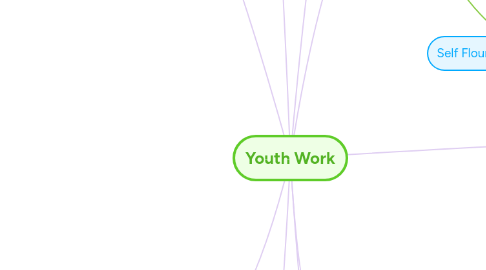
1. Priorities and Youth work
1.1. help develop social skills
1.2. help in identification of society needs
2. Perspectives of Youth work
2.1. historical perspective
2.1.1. scouts England
2.1.2. YMCA
2.1.3. Boys Brigade
2.1.3.1. Trail Rangers
2.1.4. Girls Brigade
2.2. political perspective
3. 3 approaches to model making in Youth work
3.1. Historical
3.1.1. understanding of youth work development with the passage of time
3.2. Political
3.2.1. analyze different assumptions around the world and their effect on youth work
3.3. Humanistic
3.3.1. by understanding local cultural and religious practices
4. 6 Models of Youth work Intervention
5. Youth Wok Evaluation
5.1. 4 W's of evaluation
5.1.1. truth (don't give any false ideas)
5.1.2. why
5.1.2.1. to ascertain all the targets set were achieved
5.1.2.2. to justify the use of resources
5.1.2.3. to measure the impact of activity or programme
5.1.3. what
5.1.3.1. to set the aims for achieving long term goals
5.1.4. who
5.1.4.1. can be done by any one starting from involved organisations to the participants for the purpose of improvement in future
5.1.5. when
5.1.5.1. continuous cycle; can be done any time from the start of planning till after the end of the activity or programme
5.2. 3 approaches of evaluation
5.2.1. specific criteria
5.2.2. by negotiation between involved parties on different criterias
5.2.3. control is given to the educators and participants
5.3. 6 types of work performed
5.3.1. being there
5.3.2. being about
5.3.3. by working with individuals or groups
5.3.4. by doing projects
5.3.5. by doing research
5.3.6. by reflecting on practice
6. Core Values
6.1. respect for persons
6.2. promotion of well being
6.3. democracy
6.4. fairness and equality
7. The Treatment Model
7.1. defines young people as deviant, mad or deficient
7.2. social conformity
7.3. promote good citizenship and conventional lifestyles
8. The Reform Model
8.1. defines young people as being socially disadvantaged by their environment and upbringing
8.2. youth workers require skills in motivation, rapport building and the ability to help young people identify their own needs
8.3. provide education and training to enable the young person to compete in the job market
9. The Advocacy Model
10. radical
10.1. transforming society towards the adoption of values of equality and social justice.
10.2. The role of the youth worker is to expose inequality
11. non-radical
11.1. assist the young person in acquiring whatever they deserve or are legally entitled to
11.2. to ensure that young people are aware of supports and entitlements
11.3. equal opportunities
12. The Empowerment Model
13. radical
13.1. to transform the society
13.2. society is viewed as unjust and controlled by the elite or upper classes
13.3. young people are encouraged to believe in themselves and identify oppressive factors
13.4. to address power imbalances in society without disempowering other disadvantaged groups
14. non-radical
14.1. sole motivation is to help young people gain control over their lives
14.2. allow young people to take their own decisions
14.3. youth workers need to be supportive and motivational without interfering in the process
15. people make a unanimous decision
16. confidence building
17. Informal education
17.1. respectful and spontaneous way of learning
17.2. learning is through previous experience
17.3. learning is through involving in group activities and conversations
17.4. democracy and active involvement of people
17.5. can take place anywhere and anytime
18. Youth wok and Conversation
18.1. informal education
18.2. two way conversation
18.2.1. ensure participation of every member involved in discussion
18.2.2. specific characteristics
18.2.2.1. concern
18.2.2.2. trust
18.2.2.3. respect
18.2.2.4. appreciation
18.2.2.5. affection and hope
18.3. keep the conversation group small
18.4. go with the flow of topic
18.5. democracy
19. Process of Youth work
19.1. emancipation and enlargement of experience
19.1.1. process of participants experience enlargement & not of curriculum product
19.2. flexible and creative process
19.2.1. facilitate learning
19.3. building of new relationships and gain of trust
19.4. motivating young people to try new experiences
19.4.1. gain insight of individual potential
